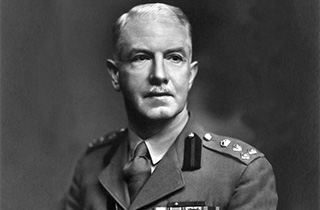John Alexander Sinton

John Sinton was born in Victoria, British Columbia, on December 2, 1884, to parents who had emigrated to Canada from Ireland. His family returned to Ulster in 1890 when Sinton was still a young boy. Sinton went on to study medicine at Queen's University, Belfast, where he graduated with honours in 1908 before earning additional degrees at the University of Cambridge and the University of Liverpool. He joined the Indian Medical Service in 1911 and would be a captain in the Indian Army during the First World War.
On January 21, 1916, Sinton was attending to the wounded during a fierce battle near the Orah Ruins in Mesopotamia (modern day Iraq). Despite being injured himself, he continued his efforts as the battle raged around him.
“For most conspicuous bravery and devotion to duty. Although shot through both arms and through the side, he refused to go to hospital, and remained as long as daylight lasted, attending to his duties under very heavy fire. In three previous actions Captain Sinton displayed the utmost bravery.”
— Victoria Cross citation, The London Gazette, June 21, 1916
Sinton was mentioned in Dispatches four times during the same campaign, and was also awarded the Russian Order of St. George.
After the war, Sinton transferred to the civil branch of the Indian Medical Service and would go on to a distinguished career as an expert in tropical diseases. He enlisted again in the Second World War before retiring with the honourary rank of Brigadier in 1943, although he spent the rest of the war continuing his work as a consultant on combatting malaria in various tropical areas. Dr. Sinton died at his home in Cookstown, Northern Ireland, on March 25, 1956, and was buried there with full military honours at Claggan Presbyterian cemetery.
- Date modified: